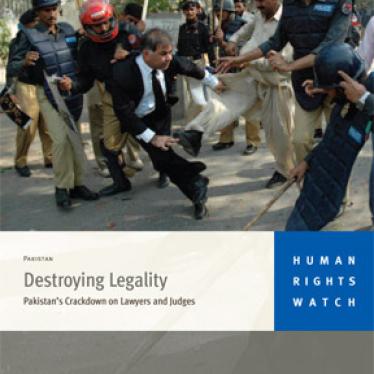The Honorable Condoleezza Rice
Secretary of State
Department of State
2201 C Street, NW
Washington, DC 20520
Dear Secretary Rice:
Thank you for meeting with the Human Rights Leadership Coalition on December 10. We would like to follow up on the conversation we had on Pakistan and respond to Assistant Secretary Richard Boucher’s recent reply to our November 13 letter.
We remain deeply concerned that you and President Bush have not yet called unequivocally for the restoration of an independent judiciary and the lifting of restrictions on the media, particularly television. Pakistan’s judiciary supervises the nomination and polling process at every level, while High Court and Supreme Court judges hear appeals regarding qualifications and fraud. The Election Commission is composed of retired and serving judges. The removal of independentminded judges has rendered free and fair elections impossible, while strict curbs on media further impede accurate reporting on the political and electoral processes. It does not make sense to call for free and fair elections without addressing these concerns.
Assistant Secretary Bouchers letter notes that the U.S. government has called for the end of martial law and the release of detainees. But the letter’s language lacks urgency when discussing judicial independence, stating only that the U.S. “encourages an independent judiciary as a significant part of any democracy.” Our organizations have heard consistently from colleagues in Pakistan that they cannot understand the silence of the U.S. government on the necessity of an independent judiciary and an unwavering commitment to the rule of law.
Since our meeting, President Musharraf has formally lifted martial law, as the United States had called on him to do. However, in his revocation order and another order issued the day before, President Musharraf renewed his attacks on the judicial system, permanently replacing the dismissed judges and barring judicial review of his actions. Orders and amendments imposed during martial law, fundamentally changing the constitution and people’s access to basic rights, remain in place and outside judicial review. Such provisions allow for military trials of civilians and suppression of the media by imposing harsh prison sentences and fines for “anything which . . . brings into ridicule” the head of state or other government officials.
We urge the United States government to call on the Government of Pakistan to restore the judges to their positions and to lift media restrictions prior to the January 8 elections. Furthermore, the Pakistani government must return the power to license or disbar lawyers to the independent Bar Council. Without such steps, some of the most dangerous aspects of martial law will become enshrined in the Pakistani legal and political system, and neither free elections nor long term stability will be possible.
Sincerely,
Mr. Larry Cox, Executive Director
Amnesty International USA
Ms. Karin Ryan, Director
Human Rights Program
The Carter Center
Ms. Jennifer Windsor, Executive Director
Freedom House
Mr. Salih Booker, Executive Director
Global Rights
Ms. Maureen Byrnes, Executive Director
Human Rights First
Mr. Kenneth Roth, Executive Director
Human Rights Watch
Mr. Gary Haugen, President
International Justice Mission
Mr. Robert Arsenault, President
International League for Human Rights
Ms. Felice D. Gaer, Director
Jacob Blaustein Institute for the Advancement of Human Rights
Ms. Robin Phillips, Executive Director
Minnesota Advocates for Human Rights
Mr. Frank Donaghue, Chief Executive Officer
Physicians for Human Rights
Ms. Monika Kalra Varma, Director
Robert F Kennedy Memorial Center for Human Rights






